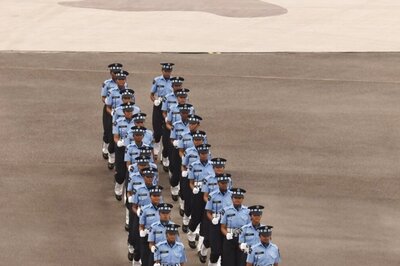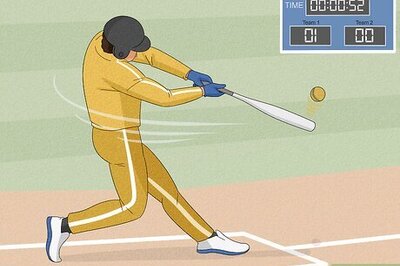
views
Even before the last vote was polled in the current Lok Sabha election, the two rival Telugu biddas — Andhra Pradesh chief minister N Chandrababu Naidu and his Telangana counterpart K Chandrashekar Rao — were locked in competition to emerge as kingmakers of an opposition coalition.
Though the two leaders initiated their moves several months ago, both Telugu Desam Party chief Naidu and Telangana Rashtriya Samithi head Rao or KCR, as he is called, renewed their respective efforts to bring together opposition parties on a common platform with an eye on the post-poll scenario.
Naidu reached out to Congress president Rahul Gandhi on a recent trip to Delhi, met West Bengal chief minister Mamata Banerjee when he went to campaign for the Trinamool Congress and has been in touch with other regional satraps like DMK’s MK Stalin, Bahujan Samaj Party chief Mayawati and Samajwadi Party president Akhilesh Yadav.
KCR, on the other hand, has an ally in Jaganmohan Reddy of the YSR Congress and believes that Odisha chief minister and Biju Janata Dal head Naveen Patnaik is also in his side of the corner. He recently air dashed to Chennai to meet Stalin, called on Kerala chief minister Pinarayi Vijayan and is planning to speak to other regional satraps like Mayawati and Mamata Banerjee.
While both Naidu and KCR are driven by their ambition to beat the other to play a larger national role, the similarities end there.
KCR has been advocating the formation of a non-BJP, non-Congress Federal Front comprising regional parties on the assumption that they will hold the balance of power after the votes are counted on May 23.
The Telangana chief minister is seeking to convince the other leaders that the country is heading for a 1996-like situation when the regional parties were in a position to form a government and have their own prime minister, even forcing the Congress to lend outside support to this formation.
So far, KCR’s endeavours have met with limited success as Stalin was lukewarm to his suggestion, stating that his party will not snap ties with the Congress and instead invited the TRS chief to join their coalition.
KCR has undoubtedly grown in confidence after he swept the assembly polls last year, virtually decimating the opposition in Telangana. But he has also earned the reputation of being untrustworthy. It is suspected that he was acting on the behest of the BJP when he suddenly decided last year to work for the formation of a Federal Front.
Though not a member of the NDA, the Telangana chief minister has taken care to remain on the right side of the Modi government over the past five years, lending it full support in Parliament.
It is perhaps to shed this tag of being called the BJP’s B-team that KCR revised his earlier stand after his meeting with Stalin, stating that the Congress is welcome to support the proposed Federal Front to be headed by a prime minister from a regional party.
KCR is clearly keeping his options open. In case the Congress wins a respectable number of seats to be able to anchor an anti-BJP opposition front, KCR would not like to be left out of the side which is most likely to call the shots at the Centre.
In contrast to KCR, Naidu has been working assiduously to cobble together an anti-BJP front since he severed his ties with the National Democratic Alliance to protest the Centre that rejected his demand to grant special category status to Andhra Pradesh. Naidu is not in favour of keeping out the Congress and has periodically maintained that an opposition coalition will not be viable unless it is anchored by a national party.
Unlike KCR, who has the advantage of establishing himself and his party as the dominant force in Telangana, Naidu is on shaky ground in his home state as he faces a tough challenge from a resurgent YSR Congress. Consequently, it has become imperative for him to be seen as a key player on the national stage so as to remain politically relevant.
But Naidu, unlike the TRS chief, has the advantage of having played the role of forging unity among opposition forces in the past. Naidu had assisted the late CPM general secretary Harkishan Singh Surjeet in the formation of the United Front in 1996 and had worked alongside other senior leaders in the ouster of the Vajpayee-led government in 2004.
He is clearly hoping that the lessons learnt from the CPM veteran and the friendships he has forged with leading opposition leaders over the years will come in handy this time. Naidu runs the risk of being politically marginalised if he does not succeed in these efforts and ends up losing his government to YSR Congress.
With less than a week to go for the declaration of election results, it is to be seen whether it is Naidu or KCR who will emerge kingmaker. Or they may well be beaten to it by former Congress president Sonia Gandhi who has also reached out to opposition leaders with the express purpose of putting up a united show if case the numbers favour them.
(The author is a senior journalist. Views are personal)




















Comments
0 comment